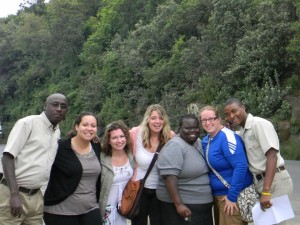
Photo by Kim Riley, provided by Connie Johnson.
Connie Johnson, a recent graduate of the MA in Social Justice and Community Development program, shares her moving and emotional experience of becoming her more authentic self while completing her program requirements this summer in Kenya.
“…I never imagined that I’d be responsible for explaining that I was result of the complex business deal known as the Atlantic Slave Trade. By the fourth time I explained our history I was emotionally and mentally spent. At home in the U.S., life distracted me from coming to terms with the fact that my family lineage had been decimated centuries earlier and could never to be accurately recovered. I’m not sure what bothered me more, not knowing who my ancestors were or knowing that my lineage wasn’t deemed worthy of preservation.m, shares her moving and emotional experience of becoming her more authentic self while completing her program requirements this summer in Kenya.
Growing up less than 80 miles from Charleston SC, the entry point of 60% of all African slaves into America, I considered myself to be rather well informed about the historical struggle of Africans in America but it wasn’t a major part of my self- identity. Within that ten day voyage I both lost and found my identity as an American woman of African descent. Before this trip I couldn’t admit to myself that I was often embarrassed by being the darkest person in almost every room I entered. I’d never admit that I made “black” jokes about myself and others in high school as an attempt to beat everyone else to the punch. I’d never verbalize the jealousy I felt because my younger sister is two shades lighter than me, therefore prettier. Before taking this voyage I didn’t realize just how deep seeded my complexion complex was and the moment I did I wept bitterly.…”
